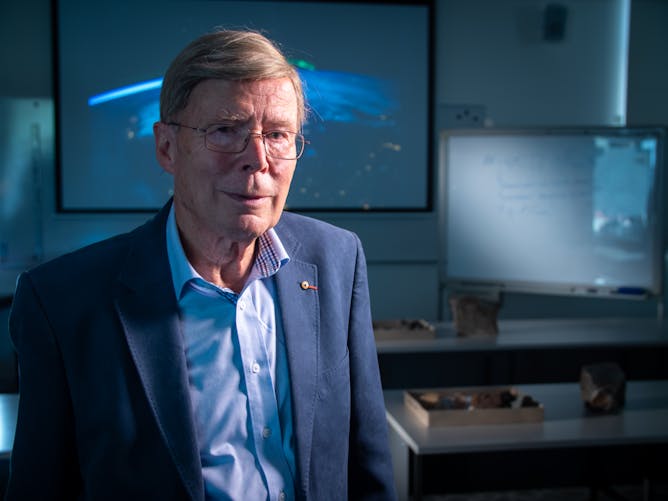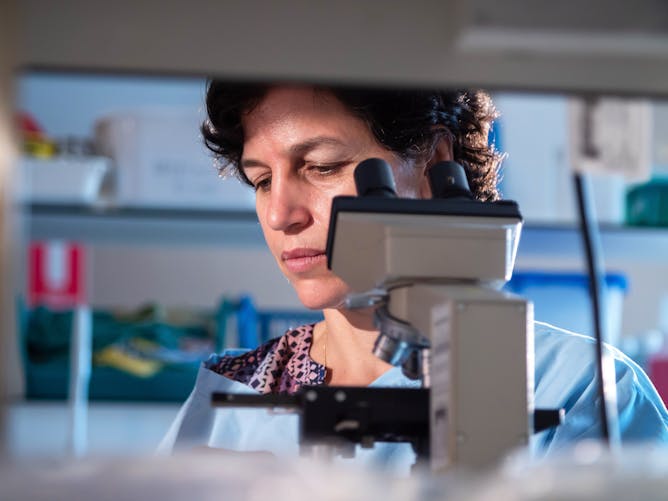|
|
|
Editor's note
|
|
Last year, the Turnbull government announced a $90 billion shipbuilding plan intended to modernise Australia’s Navy and prepare us for an uncertain future in a volatile region. But as Chris Barrie writes, it may not be enough. Compared with a rising China, Australia looks slow-moving and complacent, and lacks the agility to keep up with the times.
And last night in Canberra, the winners of the 2018 Prime Minister’s Prizes for Science were announced, with Kurt Lambeck taking the top gong for his 50-year career in geodesy – the science of monitoring how Earth’s shape and physical properties change over time. If you used a GPS system today, you were relying on his work. Lee Burger won Life Scientist of the Year for identifying a skin fungus as the cause of devastating frog deaths across Australia and the world.
|
Justin Bergman
Deputy Editor: Politics + Society
|

|
|
Top story
|

As part of Australia’s naval upgrade, construction of 12 future submarines will start around 2022-23.
Brendan Esposito/AAP
Chris Barrie, Australian National University
Compared to China's naval ambitions, we seem slow-moving and complacent and lack the agility to keep up with the times.
|

Kurt Lambeck’s work has been vital for developing GPS systems we all rely on for navigation.
Prime Minister’s Prizes for Science/WildBear
Sarah Keenihan, The Conversation
The 2018 Prime Minister's Prizes for Science were awarded at Canberra's Parliament House on October 17. Along with the top prize, life science, physics, innovation and teaching were recognised.
|

In 1998 Lee Berger identified a skin fungus as the cause of unexplained mass frog deaths.
Prime Minister’s Prizes for Science/WildBear
Lee Berger, University of Melbourne; Lee Francis Skerratt, University of Melbourne
Lee's research identified the cause of mysterious and devastating mass frog extinctions that spread across the world starting in the 1970s: it was a skin fungus.
|
Health + Medicine
|
-
Imogen Mitchell, Australian National University
In the final days of life, it may be too late to choose how you want to die, who you want to be cared by, and how you'd like your symptoms managed.
-
Amanda Devine, Edith Cowan University
Just like a mobile phone, your body needs to be recharged every day. You need to eat food and drink water every day to keep your body going. Some foods are better than others at helping you stay well.
|
|
Arts + Culture
|
-
Paul J. Maginn, University of Western Australia
A snapshot of what Australians are viewing around the country.
|
|
Business + Economy
|
-
Stephen Howes, Crawford School of Public Policy, Australian National University
Making it easier for holidaying backpackers to work on Australian farms will make it harder for Pacific Islanders, and increase exploitation on farms.
-
John Dumay, Macquarie University; James Guthrie, Macquarie University
The Modern Slavery Bill before the Senate is touted as 'smart legislation', because it asks for information rather than imposes penalties, but it mightn't be enough.
|
|
Environment + Energy
|
-
Dan Penny, University of Sydney
A new study reveals that the demise of the ancient city of Angkor was related to the fragmentation of critical infrastructure during a period of climatic instability.
-
Deborah Bower, University of New England; Ben Vincent, University of New England; Darren Ryder, University of New England; John Thomas Hunter, University of New England; Lindsey Frost, University of New England; Manu Saunders, University of New England; Sarah Mika, University of New England
Wetlands in Australia are often dry. They may look unassuming but it's a vital part of their vibrant lifecycle.
|
|
Cities
|
-
Tooran Alizadeh, University of Sydney
The Greater Sydney metropolis is envisaged as having three CBDs by mid-century, but an assessment of the proposed Central City around Parramatta shows how much work is needed to make that a reality.
|
|
Politics + Society
|
-
Michelle Grattan, University of Canberra
There's a fine line between being out and about and canvassing. Just being visible is all that's needed at this stage of a bid. And Joyce doesn't hide his ambitions for a return.
-
Michelle Grattan, University of Canberra
Jennings says it would be "silly" to claim there is no connection between this week's announcement about the possible relocation of Australia's embassy to Jerusalem and the Wentworth byelection.
-
Ran Porat, Monash University
Moving the Australian embassy to Jerusalem may cause controversy but is in line with Australia’s foreign policy interests.
-
Tony Walker, La Trobe University
Australia should focus on playing a positive role in the ongoing Middle East process, rather than auctioning off its foreign policy for the sake of winning the Wentworth byelection.
|
|
Science + Technology
|
-
Bronwyn Orr, University of Sydney; Richard Malik, University of Sydney
Another review into the safety of pet food leads to another review into pet food. It's been a decade since this issue was brought to the government's attention, so what needs to happen now?
|
|
Education
|
-
Emily Gray, RMIT University
The current loophole for religious schools does not reflect what the majority of Australia thinks about education, religion and LGBTIQ+ people.
|
|
| |
Featured jobs
|

|
RMIT University — Bundoora, Victoria
|

|
La Trobe University — Australia
|

|
University of Western Australia — Perth, Western Australia
|

|
University of Melbourne — Parkville, Victoria
|
|
|
|
| |
| |
| |

|
| |
| |
| |
Featured events
|

|
Hilton Hotel - Brisbane; Mural Hall - Melbourne; Doltone House Hyde Park - Sydney; National Museum of Australia - Canberra, Brisbane, Melbourne, Sydney, Canberra, New South Wales, 2000, Australia — The Institute of Managers and Leaders
|

|
Education Building Room 5:34, Flinders Univesity, Ring Road, Bedford Park,, Adelaide, South Australia, 5034, Australia — Flinders University
|

|
Deakin Downtown, Level 12, Tower 2 Collins Square, 727 Collins Street,, Docklands, Victoria, 3008, Australia — Deakin University
|

|
200 Leicester Street, Carlton, Victoria, 3053, Australia — Australia New Zealand School of Government
|
|
|
|
| |
| |
| |
| |
| |
|
|
|
|
|
|
|